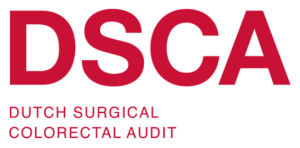The Dutch Surgical Colorectal Audit
The Dutch Surgical Colorectal Audit was founded in 2009 by medical professionals. Since then, it facilitated hospital colorectal cancer care improvement by giving detailed casemix-adjusted benchmarked feedback on patient outcomes. Among others, results of the DSCA revealed mechanisms behind variation in outcomes between providers and reduced over treatment, for example with neoadjuvant radiotherapy for rectal cancer. Furthermore, over 6 consecutive years (2010-2015), severe complications and mortality declined by a relative difference of 24% and 64% respectively, meaning more than 440 colorectal cancer deaths prevented annually. In addition, oncologic outcomes improved, for example for rectal cancer the percentage of patients in who an irradical resection was performed, decreased from 14% to 5%.
Linking these outcomes to financial data revealed that during the 2010-2012 period primary admission costs decreased by 9% without an increase within first 90-days after discharge. The DSCA showed that the business case for hospitals participating in this outcome registry was positive and leading to substantial cost reductions and improved patient outcomes.
The success of the DSCA lead to the founding of the Dutch Institute for Clinical Auditing (DICA), an organisation that facilitates 23 nation-wide outcome registries according to the DSCA blueprint and showing similar results in improving outcome for patients. Moreover, the DSCA was the first registry providing full transparency on hospital specific outcomes to insurers, patient organisations, government and the public. The DICA case has been described as a international example for value based health care by the International Consortium of Health Outcomes Measurement (www.ichom.org)

